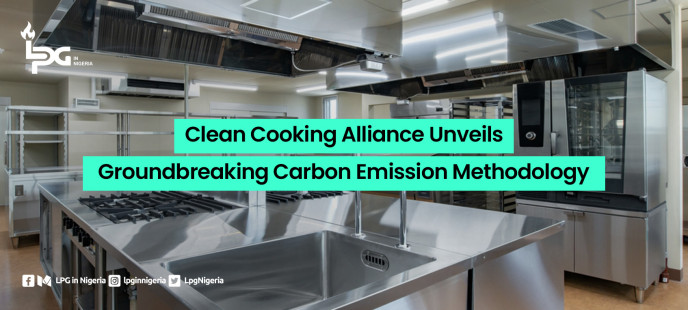- 3338
- 0
Sharing Ideas and Updates on LPG in Nigeria and related information to enable effective collaboration within the LPG Value Chain
Clean Cooking Alliance Unveils Groundbreaking Carbon Emission Methodology

Washington, D.C., July 1, 2024 — The Clean Cooking & Climate Consortium (4C), spearheaded by the Clean Cooking Alliance (CCA), has introduced an innovative methodology designed to credit emissions reductions from cooking projects. Named the Comprehensive Lowered Emission Assessment and Reporting (CLEAR) Methodology for Cooking Energy Transitions, it is the first of its kind to encompass all cooking transition scenarios. This new framework allows project developers to utilize a consistent, reliable approach for calculating carbon emission reductions from clean cooking initiatives. The public is encouraged to review and provide feedback by August 14, 2024.
4C is a coalition of partners dedicated to advancing climate goals through cooking energy interventions. Alongside CCA, 4C’s members include the U.S. Environmental Protection Agency (EPA), the United Nations Framework Convention on Climate Change secretariat, the Climate and Clean Air Coalition, Berkeley Air Monitoring Group, and the Stockholm Environment Institute.
Over the past 18 months, 4C has led a comprehensive, sector-wide effort to craft this clean cooking carbon methodology. More than 250 key stakeholders, including standards bodies, project developers, researchers, and carbon buyers, contributed to the process.
“Over 2 billion people are forced to cook with inefficient and polluting stoves and fuels, producing emissions equivalent to the global aviation industry,” said Dymphna van der Lans, CEO of CCA. “Clean cooking is finally being recognized as a critical, fast-acting climate solution that requires significant investment. This methodology is vital for strengthening carbon markets, making clean cooking solutions more accessible and affordable for low-income families worldwide.”
John Mitchell, U.S. EPA Household Energy and Clean Air Coordinator, echoed this sentiment: “The CLEAR methodology is a public good that can standardize and expand the best practices already seen in many clean cooking carbon projects. It assures consumers and investors that cooking carbon credits are credible, sustainable, and rigorous.”
The CLEAR methodology is poised to become the standard for all cooking projects under Articles 6.2 and 6.4 of the Paris Climate Agreement, as well as within the Voluntary Carbon Market. It incorporates cutting-edge science, robust measurement and monitoring techniques, and stringent safeguards where direct measurement isn't possible. The methodology applies to both "metered" and "non-metered" clean cooking projects, offering various approaches to determine emissions reductions, including surveys, sensors, and fuel consumption monitoring.
“By adopting this methodology, clean cooking carbon projects will produce the most accurate emission reduction estimates to date,” said Elisa Derby, CCA Senior Director of Climate Impacts and Standards. “The CLEAR methodology is designed to promote best practices, enhance transparency in emissions calculations, and simplify the verification process. Being the first methodology to apply to all cooking transition scenarios, it eliminates the need for multiple methodologies.” The new methodology aligns with CCA’s recently launched Principles for Responsible Carbon Finance in Clean Cooking, which emphasize integrity, transparency, fairness, and sustainability, and have been endorsed by over 160 organizations within the clean cooking ecosystem.
We are of the opinion that the introduction of the CLEAR Methodology for Cooking Energy Transitions can have a transformative impact in Africa, particularly in Nigeria, where a significant portion of the population relies on inefficient and polluting cooking methods. By standardizing the way carbon emissions reductions are calculated and credited, this methodology can attract greater investment in clean cooking projects, making these solutions more accessible and affordable for low-income households. In Nigeria, where the health and environmental consequences of traditional cooking practices are severe, this could lead to improved public health, reduced deforestation, and a significant decrease in climate-damaging emissions. Furthermore, the methodology’s emphasis on transparency and rigor will build trust among consumers and investors, encouraging the growth of sustainable clean cooking initiatives that can contribute to the country's broader climate and development goals.
Source: Clean Cooking Alliance.
















0 Comment.